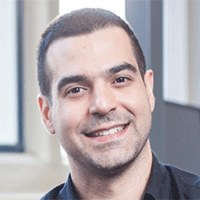
Thursday, November 21, 9:00am-9:45am
Dr. Farbod Alijani
TU Delft
Presenting in Track 7: Dynamics, Vibration & Control
Sponsor: Applied Mechanics Division
Presentation Title: Harnessing Nanomechanical Vibrations of Two-Dimensional (2D) Materials
Abstract: Two-dimensional (2D) materials are unique platforms for studying fundamental science. They bridge the gap between the world of atomic scale dynamics and the world of macroscopic mechanical vibrations. Because to their size nature, they can enable exploration of research areas that lie at the forefront of classical and quantum technologies. But at the same time, their noisy and nonlinear nature limits their performance. This combination of fluctuations and nonlinearities brings to light a new regime of mechanics that has remained largely unexplored, and that, if well-understood, can open a wide range of trajectories in high-performance sensing and lab-on-a chip devices.In this talk, I will present theory and experiments for using nonlinear and noisy dynamics of 2D materials to sense the nanomechanical properties of ultrathin materials, unravel their nonlinear dissipation processes and detect very weak signals. By fitting experimental data with nonlinear models and relating nonlinear parameters to membrane nanomechanics, I first propose contactless methods for extracting material properties of 2D materials. I will then show how by engineering nonlinear damping in these materials mechanical frequency combs can be generated, and highlight the role of parametric resonance as an ultrasensitive probe for nonlinear dissipation measurements. Finally, I discuss the use of noisy dynamics of 2D materials for detecting nanomechanical motion of micro-organisms, and show how this rich and complex dynamics can be used to infer new information about infectious diseases and detect antibiotic resistance at the single cell level.
Biography: Farbod Alijani is an associate professor in the Precision and Microsystems Engineering (PME) department at TU Delft. His research line focuses on understanding fundamental phenomena associated with linear and nonlinear dynamics of micro and nanomechanical systems to engineer novel technologies in the fields as varied as high-tech systems and bio-health. This includes modelling, fabrication, and testing very sensitive and extremely small structures. Some of these devices are one to a few atoms thick such as graphene, which can produce new features, non-existent at larger scales. Since these devices are too small to be studied by conventional techniques, Farbod's group focuses on the development of unique characterization methodologies to study mechanical behaviour at the nanoscale. One such technology led to the demonstration nanomechanical motion of single bacteria using graphene drums that was nominated as the science breakthrough of the year in 2022 by the falling walls foundation and is currently at the centre of SoundCell B.V; a start-up that aims at delivering rapid diagnostic technologies for fighting antibiotic resistance. In addition to this technology, Farbod's group also has strong track record in disclosing new phenomena and new tools in nanotechnology that have been published by Nature Nanotechnology, Nature Communications and Physical Review Letters. Farbod is recipient of European Research Council (ERC) starting, proof-of-concept, and consolidator grants, that are the most prestigious in Europe, as well as European Innovation Council (EIC) transition grant. He is co-inventor of 4 patents and is currently serving in the editorial board of International Journal of Non-linear Mechanics.